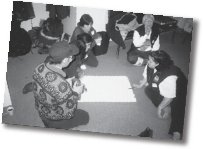
As the child is immersed in the stories and customs of the communities, he learns more about the traditions, values, and beliefs associated with hunting in an Inupiat community. Before his first hunt, he has listened to hunting stories for years. These were both entertaining and informative. As a result of these stories told by Elders and veteran hunters, the young child constructs a mental image of all that is required and some sense of the important aspects of preparing and engaging in the hunt.
Many of the stories he listens to as a child were stories that emphasized the disposition, the attitude, of the hunter. In these stories bragging and pride in personal accomplishment would be condemned. In the stories animals can read the mind of the hunter and either give themselves or not, in part based on an appreciation of the giving of the physical body. Even after the animal gives up the body, respect should be shown in definite ways according to the stories and traditions. This is why some hunters, who are deacons and respected members of churches, still pour fresh water in the mouth of a seal after it has been shot. The belief is that the seal likes fresh water and that the undying nature of the seal will remember the gesture and bring another body for the hunters later.
The stories about animals giving themselves to hunters might not seem to make sense to outsiders, but it is difficult to imagine anything else, if a person has hunted very long. There are times, when in spite of careful planning and preparation, cautious stalking and quiet approaches, no animal will allow a hunter to even remotely approach. At other times a person will be setting up camp and a caribou or moose will walk within a stone’s throw and then patiently wait for the hunter to take advantage of their good fortune. How else to account for these turns of events that have so little to do with skill and more to do with the disposition of the animal? Today, some Westerners might deride such practices and beliefs.
But perhaps the stories are actually about protecting and helping the hunter. Respect for the animal being hunted may prevent the hunter from becoming overly confident or prideful. Pride often produces carelessness and may prevent learning and observation from occurring. In fact, pride and arrogance can be fatal in the Arctic where the best lesson to keep in mind is how little we actually know and how easily we can be swept from the world.

Showing respect for the animals also ensures that better care will be taken of the physical remains of the animal. The importance of such a disposition for the Inupiat hunter is obvious. Often the stories children hear will emphasize how clever, thoughtful, and ingenious a person has been in becoming successful as a hunter and a provider to the community.